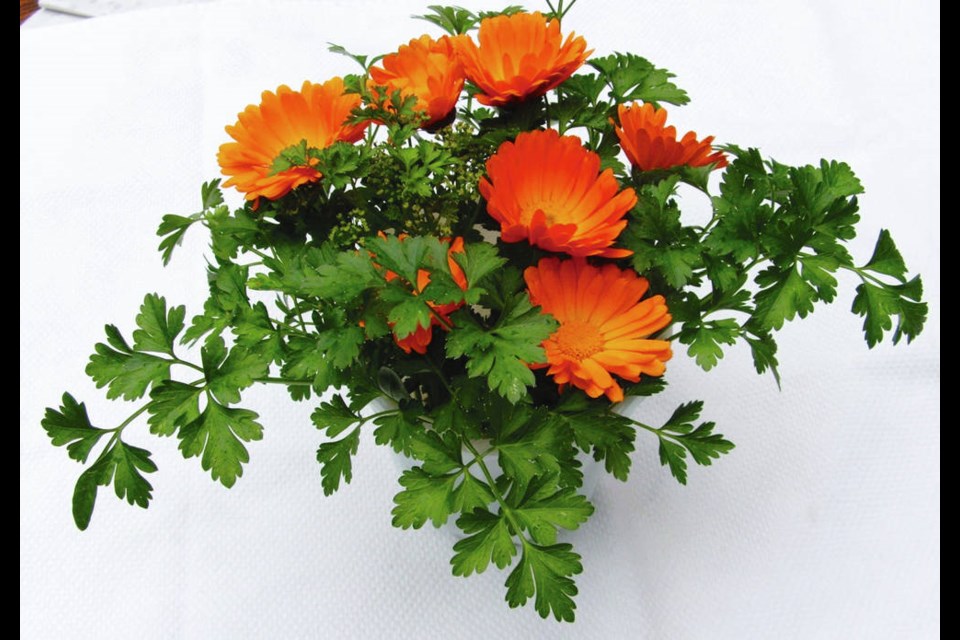I’ve been spending many evenings on the phone recently, speaking with my sister-in-law, now the widow of my youngest brother, who died suddenly at the end of August. I’ve never spent so much time on the phone before, as the family tries to navigate through the shock.
In a recent call, my sister-in-law told me that, every night, she gives thanks for the time they had together. And after a few weeks, she returned to her regular exercise program and walking with friends.
It has struck me that, in those two measures — gratitude and physical movement — lie powerful antidotes to depression and grief.
In the uncertain and sometimes sorrowful times we live in, have we not been supremely grateful for our gardens, whether they be an acreage, a back yard, a community plot or a few pots filled with living things to care for?
Our gardens, and the exercise that comes with tending them, help to keep our spirits uplifted and our bodies strengthened. Food, flowers and foliage are not everything in our gardens. We are growing hope, and health.
So much to be grateful for.
Thanks to the friend who told me of a personal ritual whenever someone in her life dies. She collects a few flower heads and sends them away on the ocean as the tide is going out. Those coloured bits of life, flowing down a stream or out on a tide, can embody a letting go and a blessing on a loved one’s spirit journey.
Thanks for the little gifts that arise in gardens to surprise and delight, things simple yet important: clouds of bees busily collecting nourishment from yellow kale and wild arugula flowers; hummingbirds visiting the corydalis and strawberry tree blooms next to my office window; a shovelful of soil revealing fat earthworms at their essential work of tilling and fertilizing.
Thanks for the “bonus” plants that surface magically in gardens, like the big, flamboyant annual poppies that leave behind large heads filled with seeds for the next generation of plants and for enlivening our baking.
Self-perpetuating calendula plants brighten the garden with sunny orange and yellow daisy flowers. A potato plant that appeared inside a half-circle of wire fencing grew this summer to produce eight large tubers, nicely elongated ovals with purple skin and purple flesh that makes delectable, pinkish-purple mashed potatoes. Russian Blue is the variety. It’s an easy-growing, high-yielding, flavourful potato.
Thanks to the local garlic grower who gave me five gigantic bulbs from his own prized planting stock. To honour the gift, I dug over a plot far from the voracious tree roots that suck the life out of the soil in parts of my food garden. Then I mixed in a dusting of lime, a hefty layer of compost, and a scattering of a natural-source, slow-release fertilizer before planting.
The small plot was a perfect size for 30 fat cloves, 10 in each of three rows, planted in the fourth week of September. I am anticipating a fine garlic harvest next July.
Thanks to the David Suzuki Foundation for an email message noting that every kilo of produce we grow at home instead of buying it at a store cuts greenhouse gas emissions by two kilograms. Why? No transportation emissions, and reduced need for processing and refrigeration. The next best thing for the environment is to support local farmers by purchasing what we don’t grow at farmers’ markets.
Thanks to Bob Woodward of Watergate fame, who in a recent interview delivered a description that brought a comical image of gardening to mind. He was being interviewed when his latest book, Rage, was published.
At one point, he spoke of the necessarily dogged nature of investigative journalism: “Nose down, bottom up, moving slowly ahead.” He didn’t actually use the word “bottom.” That’s my substitution, for the sake of decorum.
The image brought immediately to mind a common stance of many gardeners as we tend plantings and pluck weeds. In fact, the husband of one gardening companion says that’s how he locates us when he drops by for a visit: bottoms up, nose down, moving slowly along.
A happy, gratitude-filled Thanksgiving to all. “Let us be grateful to people who make us happy; they are the charming gardeners who make our souls blossom.” (Marcel Proust).



